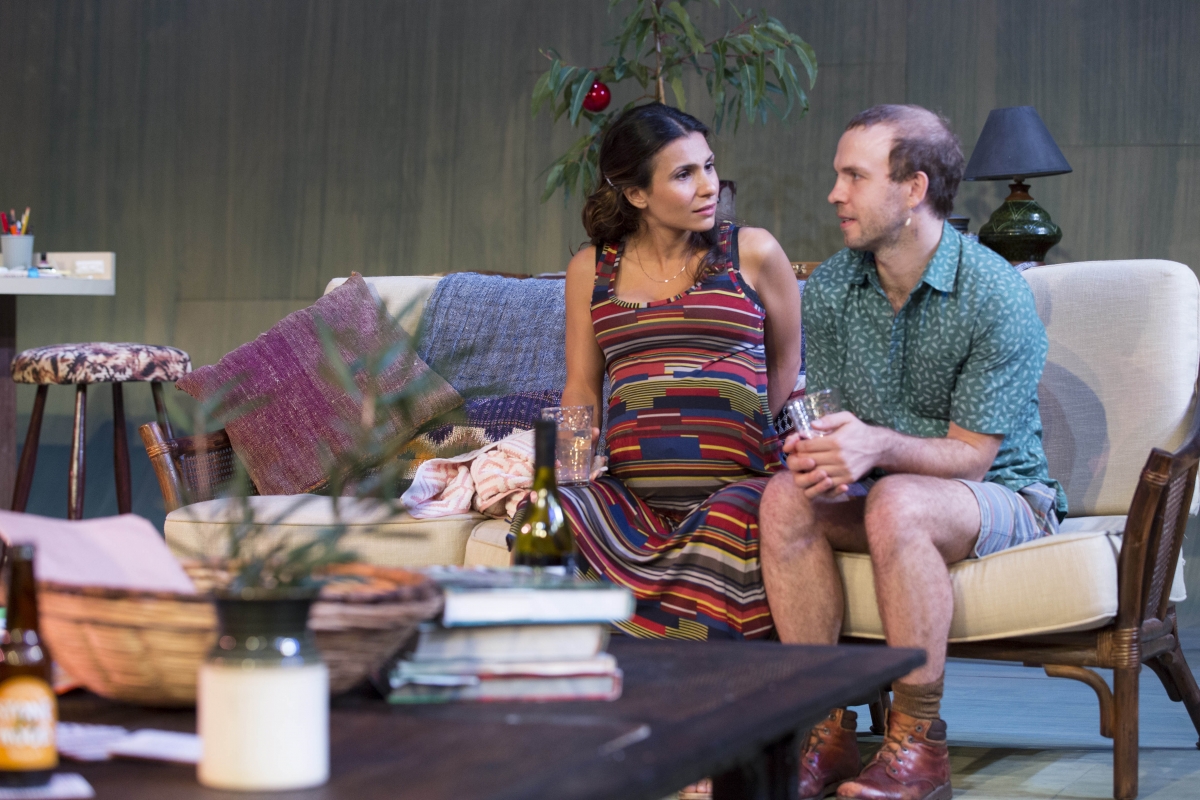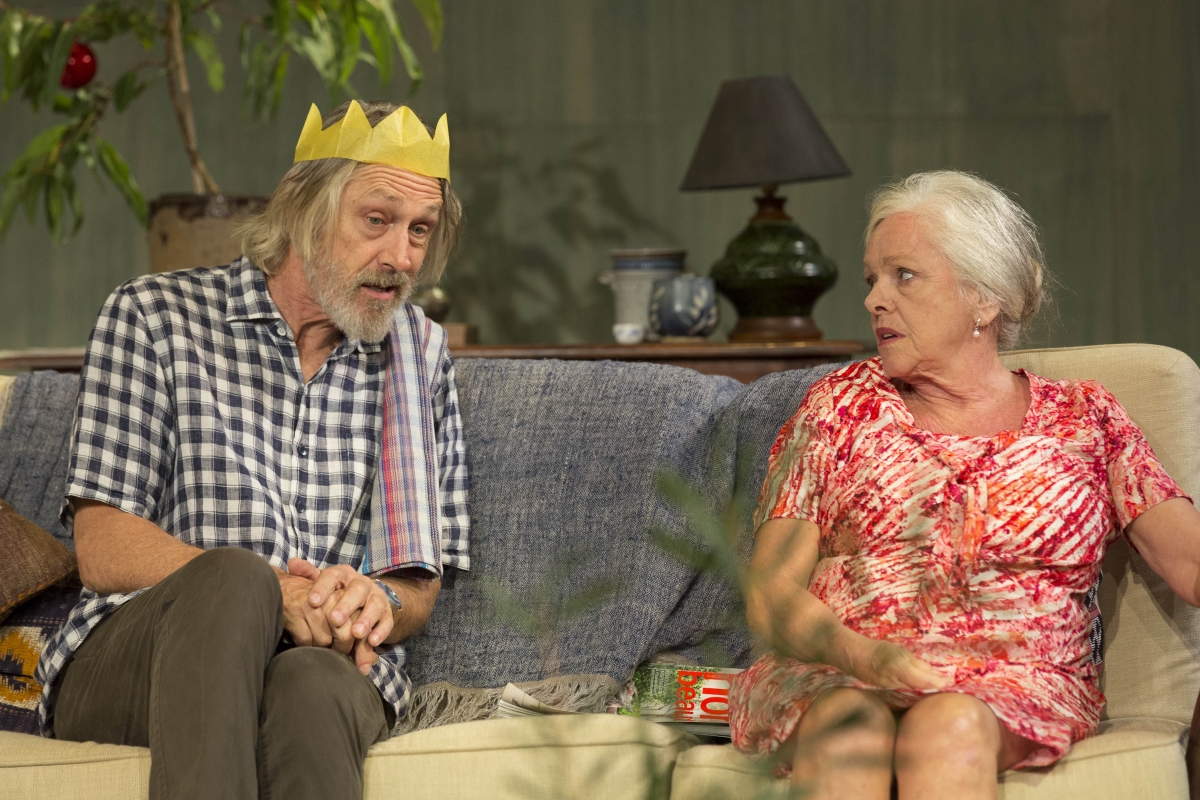★★★½☆ New Australian play from Brookman is entertainingly insightful about the country’s diminishing returns.
Belvoir, Sydney
April 6, 2016
The Whitlam generation had it good. Free education. Free love. A free run, particularly if you belonged to the middle-class milieu, to buy your own land well before values soared, where you could build your own home, from which you might pursue previously un-Australian passions such as art and literature and theatre. There, you could raise three children and, when the battering winds of ’80s and ’90s globalism blew forth a new century of inter-generational inequality, let these young adults stay on for a peppercorn rent.
In the present day, writer Judith (Genevieve Picot) and her company-man husband Patrick (Geoff Morrell), who are now about 60, have returned for Christmas from their second home, in Sydney, to the house they built in the Adelaide Hills. Eldest child Lily (Shelly Lauman), a theatre-maker, now lives here, with her loud, self-absorbed playwright husband Michael (Eden Falk). When all three of Judith and Patrick’s children arrive, all under one roof for the first time in a few years, Judith surveys them. “We’re so lucky,” she says, yet the siblings have all inherited their mother’s slightly anxious bearing, increasingly so with descending order of birth, and none of them are currently employed.
Lily, in her mid-30s, hasn’t had a successful show for a few years. Alex (Yalin Ozucelik), in his early 30s, is desperate to hear the outcome of a job interview, and has to convince himself he is happy his wife Hannah (Sarah Armanious) is about to have a baby, his parents’ first grandchild. Youngest child Tom (Marcus McKenzie), a published poet in his mid 20s, is contorted by indecision about everything, his body falling in on itself, barely concealing the pain of splitting with his boyfriend. He thinks he’s “anti-matter” and a “black hole”; indeed he’s the sort of introverted guy others fail to notice is still in the room as they flick the light switch off.

Sarah Armanious and Marcus McKenzie © Brett Boardman
In their prime, Judith and Patrick thought they could build a self-sufficient life for their family here. “We really, truly thought that you could change the world through love,” Judith tells them, sounding a bit John and Yoko, with the sort of comparatively healthy bank balance that can afford such platitudes. The reality was that Judith felt isolated in this home raising three children without a driver’s licence. Now, she’s surveying the house again with a proprietorial air. Do Judith and Patrick want to move back in? Bushfire threat and the spectre of global warming ring-fence this ensemble of 10, dialling up the drama of an uncertain future, as middle-child Alex pushes for a sale of the family inheritance, to benefit the beleaguered siblings’ lives now.
This is a very funny work, especially when the tension hits its stride for the third and fourth acts, set on Christmas Day and New Year’s Eve respectively. Playwright Kit Brookman steps up to the Belvoir main stage here and confidently delivers a meaty exploration of the social, political and cultural changes wrought in Australia over the past 50 years. The structure is more conservative than his previous offering, the partly surreal A Rabbit for Kim Jong-Il at Griffin Theatre, in which Brookman himself dressed in a rabbit suit to play a talking bunny. The craftsmanship is polished. Brookman knows these people: love never escapes this clan, even as their collective future is visibly breaking down.

Geoff Morrell and Lynette Curran © Brett Boardman
It’s a wordy play. I wondered through the first two acts if we needed to have less of Judith and Patrick so painstakingly (and painfully) pontificating their free-spirited 1970s manifesto, for instance. But then, this is not the sort of family that flicks on the telly to watch the cricket during the festive season. They talk about life and the arts in broad brushstrokes, like some sort of Chekhovian gathering in the antipodes. Nonetheless a few more ellipses and pauses might help the tense dynamics sink in. I also found Michael Hankin’s set design of the family home distractingly busy with too many tables, books and chairs. Perhaps you could argue the siblings’ paths are cluttered, with both physical and psychic roadblocks laid down by their parents and the new competitive, borderless economy.
Director Eamon Flack knows how to position the performances against too-easy sentiment, and the work is beautifully cast. Peter Carroll’s physically witty turn as grandfather Donald, for instance, is all the more effective in its refusal to play to mawkish pity about dementia. Sandy Gore brings gravitas and a counterpoint of perspective to artist neighbour Alison, while Lynette Curran’s arrival as gran Mary is so universally recognisable, palpably lifting the energy in the theatre: the heightened and nervously chipper greetings to and from the elders.
The kids each get their turn to shine and shudder at the bleak road ahead. Yalin Ozucelik lets loose with the fabulous fury of Alex’s spray against Judith and Patrick’s self-absorption: “… as soon as we can make our way we’ll have to be supporting all you old people clinging onto life, lifting you above our heads in the manner to which you have become so exquisitely accustomed, wading into the sea as it rises around us!” McKenzie’s defeated physicality as Tom may be held a little too tightly for a little too long, but when the wall finally breaks – “who could ever love someone so stupid and useless”, he cries – his performance is affecting. Picot’s work here as Judith is particularly good, her coda with her suffering miracle baby boy note perfect.
Belvoir Street Theatre presents The Great Fire until May 8











Comments
Log in to join the conversation.